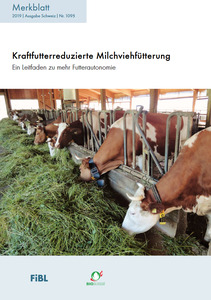{Tool} Dairy cattle feeding with reduced concentrates. [Kraftfutterreduzierte Milchviehfütterung.] Creator(s): Notz, Christophe. Issuing Organisation(s): FiBL - Research Institute of Organic Agriculture, Bio Suisse. (2019)
![[thumbnail of 2025-06-09 15_23_26-Kraftfutterreduzierte Milchviehfütterung. Ein Leitfaden zu mehr Futterautonomie .png]](/55811/1.hassmallThumbnailVersion/2025-06-09%2015_23_26-Kraftfutterreduzierte%20Milchviehf%C3%BCtterung.%20Ein%20Leitfaden%20zu%20mehr%20Futterautonomie%20.png)  Preview |
Image (PNG)
- Cover Image
- German/Deutsch
1MB |
Preview |
PDF
- Published Version
- German/Deutsch
3MB |
Preview |
PDF
- Published Version
- French/Francais
2MB |
Document available online at: https://www.fibl.org/de/shop/1095-kraftfutterreduktion
Summary
The tool explains why it is worthwhile reviewing the use of concentrates. It provides pointers for assessing the savings potential on your own farm and guides you step by step through the process of reducing concentrates.
Summary translation
Das Merkblatt erläutert, weshalb es sich lohnt, den Kraftfuttereinsatz zu überprüfen. Es liefert Anhaltspunkte für das Einschätzen des Einsparungspotenzials im eigenen Betrieb und führt Schritt für Schritt durch den Prozess der Kraftfutterreduktion.
| EPrint Type: | Practice tool |
|---|---|
| Teaser: | A guide to more feed autonomy. |
| What problem does the tool address?: | A guide to more feed autonomy. There are good reasons to question the use of concentrates in dairy cattle feeding, because on the one hand, high concentrates are not considered species-appropriate for ruminants, as the digestive system of ruminants is not designed to utilize cereals and grain legumes. Furthermore, low concentrate production in Switzerland requires high imports. This is a burden on the environment. In addition, the high cost of concentrated feed in Switzerland and its low efficiency worsen the profitability of milk production. |
| What solution does the tool offer?: | Several years of FiBL trials on practical farms have shown that the use of concentrates can be reduced on many farms without economic losses and negative impacts on animal health or fertility. However, a successful reduction in the use of concentrates requires optimum feed production on the farm and good herd health. |
| Country: | Switzerland |
| Type of Practice Tool: | Leaflets & guidelines |
| Keywords: | climate change, climate change adaptation, climate-smart agriculture, resilience, dairy cattle, cattle, feed crops, feeds, feeding, feed requirements, nutritive value |
| Agrovoc keywords: | Language Value URI English climate change http://aims.fao.org/aos/agrovoc/c_1666 English climate change adaptation http://aims.fao.org/aos/agrovoc/c_1374567058134 English climate-smart agriculture http://aims.fao.org/aos/agrovoc/c_1361789093890 English resilience http://aims.fao.org/aos/agrovoc/c_1374480530924 English dairy cattle http://aims.fao.org/aos/agrovoc/c_2108 English cattle http://aims.fao.org/aos/agrovoc/c_1391 English feed crops http://aims.fao.org/aos/agrovoc/c_2829 English feeds http://aims.fao.org/aos/agrovoc/c_2843 English feeding http://aims.fao.org/aos/agrovoc/c_2838 English feed requirements http://aims.fao.org/aos/agrovoc/c_27930 English nutritive value http://aims.fao.org/aos/agrovoc/c_5278 |
| Subjects: | Animal husbandry > Production systems > Dairy cattle Animal husbandry > Feeding and growth |
| Research affiliation: | Switzerland > FiBL - Research Institute of Organic Agriculture Switzerland > Animal > Cattle European Union > Horizon Europe > OrganicClimateNET > selected tools European Union > Organic Farm Knowledge |
| Horizon Europe or H2020 Grant Agreement Number: | 101136880 |
| Related Links: | https://organic-farmknowledge.org/tool/55811, https://organicclimatenet.eu/, https://organic-farmknowledge.org/tool/54377, https://organic-farmknowledge.org/tool/53743, https://organic-farmknowledge.org/tool/55491, https://organic-farmknowledge.org/tool/53645 |
| Project ID: | OFK |
| Deposited By: | Rüger, Madelaine Lea |
| ID Code: | 55811 |
| Deposited On: | 10 Jun 2025 09:11 |
| Last Modified: | 10 Jun 2025 09:11 |
| Document Language: | German/Deutsch, French/Francais |
| Status: | Published |
Repository Staff Only: item control page

 Download Statistics
Download Statistics Download Statistics
Download Statistics
